Over 30 years of anarchist writing from Ireland listed under hundreds of topics
Strikes
The British Miners strike of 1984-85 -Video & Audio from DABF 2014
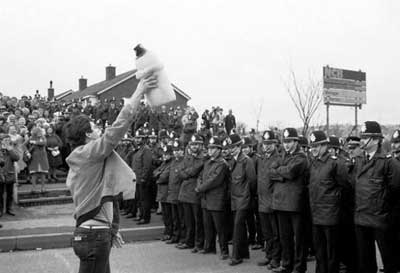 At this session at the Dublin anarchist bookfair Dave Douglass talked about his experiences of 1984 - the year the British mines almost defeated Thatcher. "That fight in 84-85 involved the whole community, it was not only about unions. It was partly about unions but it was about an industry, it was about a way of life. The miners were almost an ethnicity, with father to son for hundreds and hundreds of years in the same miner family. And we had a very strong revolutionary and radical tradition. So, all of the politics of power, fuel power was about political power and not just about energy. It was about more than that. It was about "Who rules ?""
At this session at the Dublin anarchist bookfair Dave Douglass talked about his experiences of 1984 - the year the British mines almost defeated Thatcher. "That fight in 84-85 involved the whole community, it was not only about unions. It was partly about unions but it was about an industry, it was about a way of life. The miners were almost an ethnicity, with father to son for hundreds and hundreds of years in the same miner family. And we had a very strong revolutionary and radical tradition. So, all of the politics of power, fuel power was about political power and not just about energy. It was about more than that. It was about "Who rules ?""
General strike - Protest or process?
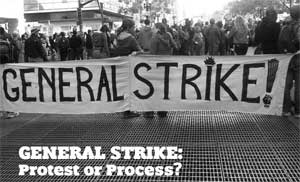 On Merrion square, an evacuation is in progress. Thousands of people scatter in all directions; panic is etched across their faces. To the casual observer, this is a life or death situation. There is however, no crazed gunman, no volcano, no earthquake nor alien invasion. They are fleeing the catastrophe that is the Irish Congress of Unions (ICTU) bank debt protest.
On Merrion square, an evacuation is in progress. Thousands of people scatter in all directions; panic is etched across their faces. To the casual observer, this is a life or death situation. There is however, no crazed gunman, no volcano, no earthquake nor alien invasion. They are fleeing the catastrophe that is the Irish Congress of Unions (ICTU) bank debt protest.
Take Back The Power! - Our message to ICTU's anti-debt marches 9th Feb '13
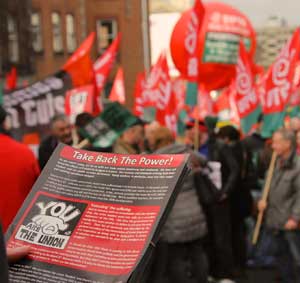 It is time for every one of us to take responsibility for trying to turn things around. We have to stop referring to ‘the union’ as something outside of ourselves and begin to see that our unions are OURS. We have to stop seeing ‘head office’ and ‘the officials’ as anything other than employees of the union - our employees who should be taking their instruction from us. And we have to convince our fellow-workers that there is a benefit to engaging with the union structures and organising to resist.
It is time for every one of us to take responsibility for trying to turn things around. We have to stop referring to ‘the union’ as something outside of ourselves and begin to see that our unions are OURS. We have to stop seeing ‘head office’ and ‘the officials’ as anything other than employees of the union - our employees who should be taking their instruction from us. And we have to convince our fellow-workers that there is a benefit to engaging with the union structures and organising to resist.
The trade unions
The Workers Solidarity Movement position on the trade unions including an anarchist analysis of the unions and what sort of demands anarchists should put forward in the unions. This paper was retired at the July 2017 WSM national conference as the accumulation of three decades of modifications had made it cumbersome and outdated. It is preserved here to reflect that debate and because it was a fundamental foundational document of WSM drawn up in part through exchanges with with the FdCA in Italy.
The Dunnes Strike & Managing Change - the two souls of the trade union
For three weeks, in June-July 1995, nearly 6,000 mostly young and part-time workers struck against Ireland's largest private sector employer, the firmly anti-union Dunnes Stores, over Sunday trading, zero-hours contracts, the proportion of full-time jobs and other issues. But the principal, and unstated, issues were probably union recognition and the organisation of the newly emergent semi-casual, part-time, young (and mainly female) section of the labour force. The result, while disappointing on the concrete 'economic' issues, was generally greeted as something of a breakthrough on the latter 'political' issues.
Union activists are facing new management attacks but the trade union leadership speaks only of partnership with the bosses. Des Derwin, member of the Executive of the Dublin Council of Trade Unions and of the Dublin Private Sector Regional Executive Committee of SIPTU gives his personal view on the two souls of the unions.
In defiance of government spin nurses cry Enough is enough
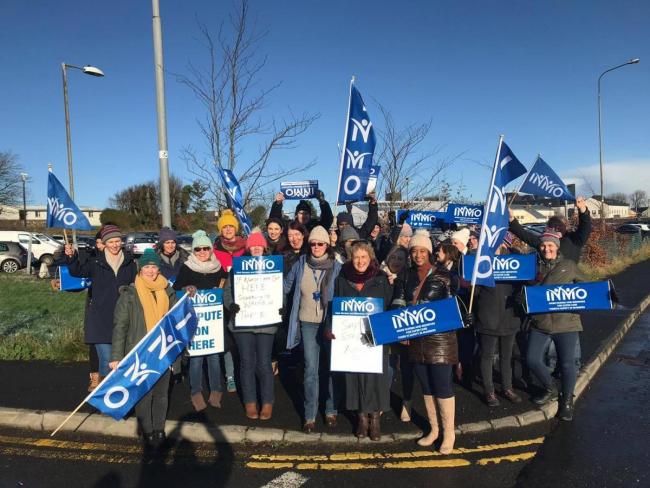 The West’s awake, so too the other provinces, as defiant nurses and midwives take to the picket lines. Buoyed by massive public support, members of the Irish Nurses and Midwives Organisation (INMO) took part in their first strike in 20 years.
The West’s awake, so too the other provinces, as defiant nurses and midwives take to the picket lines. Buoyed by massive public support, members of the Irish Nurses and Midwives Organisation (INMO) took part in their first strike in 20 years.
Generally feeling undervalued and suffering the effects of prolonged understaffing and hospital overcrowding these workers counter-intuitively withdrew their labour in the first of a series of 24-hour work stoppages.
Known for their dedication and immense sense of good will which has for decades covered up the cracks in a health service that itself seems to be in ill-health, this female dominated profession has once again risen up to say “Enough is enough!”
Nurses strike to defend health system & demand pay parity begins
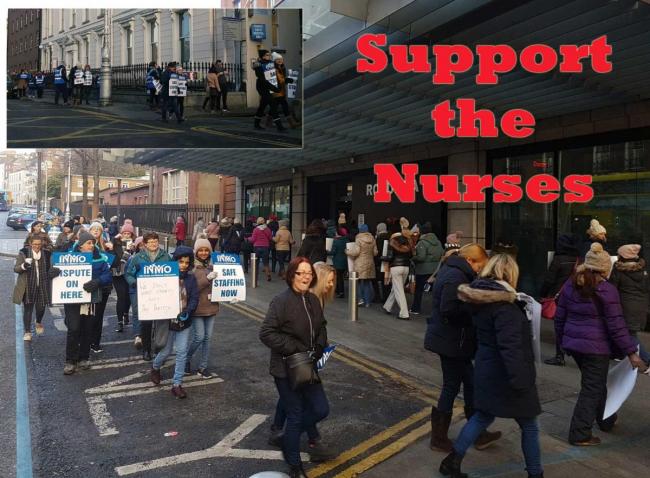 This morning saw pickets being placed on hospitals all over the country as nurses and midwives strike against low pay. Pay now so low relative to rent and house prices that its impossible for many to find decent accommodation in the major cities on what they take home.
This morning saw pickets being placed on hospitals all over the country as nurses and midwives strike against low pay. Pay now so low relative to rent and house prices that its impossible for many to find decent accommodation in the major cities on what they take home.A great display of solidarity from transport workers as Bus Eireann strikers mount secondary pickets
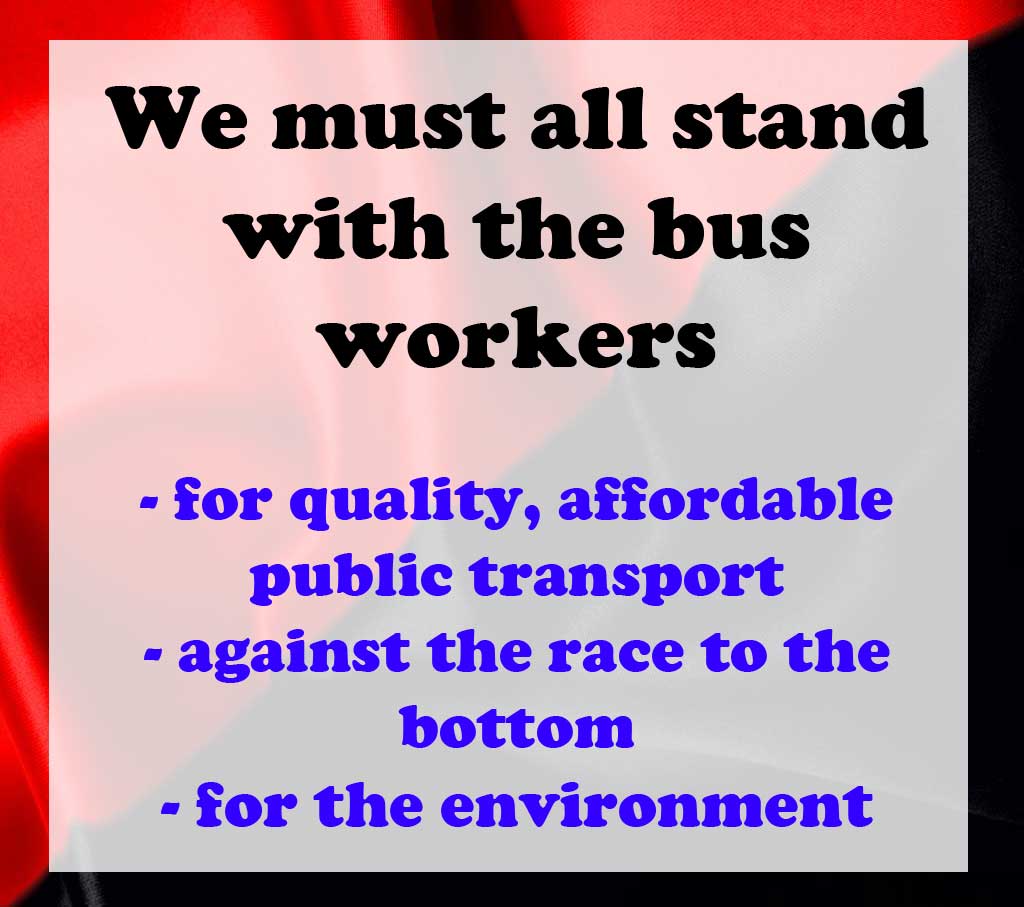 Inter city bus workers in Ireland launched widespread secondary pickets at 4am this morning. Solidarity from transport workers at the other services picketed meant that most of the country ground to a halt as morning rush hour approached, almost all trains, Dublin bus and light rail services did not operate.
Inter city bus workers in Ireland launched widespread secondary pickets at 4am this morning. Solidarity from transport workers at the other services picketed meant that most of the country ground to a halt as morning rush hour approached, almost all trains, Dublin bus and light rail services did not operate.
Hitting Tesco where it hurts: Strike sees sales fall more than 80% leading to back down
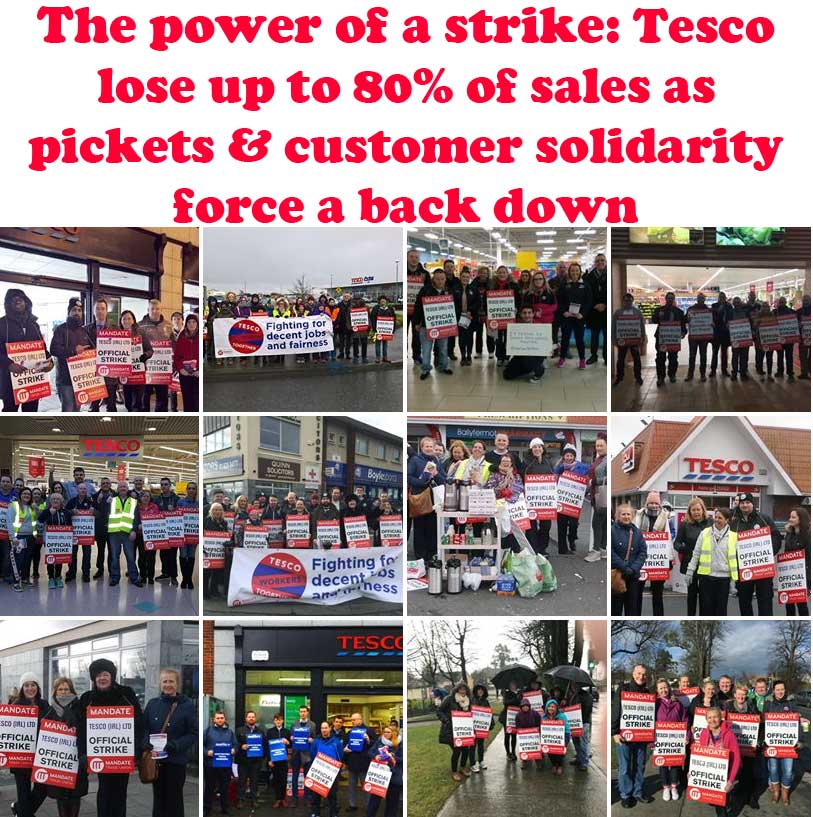 Tesco agreed Friday to suspend its attempt to impose a worsening of pay and conditions on its long term workers and to return to the Labour Court, leading to the suspension of the strike. Monday’s Irish Times carries a report on just how hard Tesco have been hit by the strike action, the Finglas superstore saw a massive 80% decline in takings. These leaked figures stand in stark contrast to the attempt by Tesco PR to suggest the strike was ineffective and unpopular.
Tesco agreed Friday to suspend its attempt to impose a worsening of pay and conditions on its long term workers and to return to the Labour Court, leading to the suspension of the strike. Monday’s Irish Times carries a report on just how hard Tesco have been hit by the strike action, the Finglas superstore saw a massive 80% decline in takings. These leaked figures stand in stark contrast to the attempt by Tesco PR to suggest the strike was ineffective and unpopular.
The figures reveal that even those stores which had not yet voted to strike, and which subsequently did not have pickets, saw a decline of 30% in sales. According to Conor Pope’s report in Tesco Clearwater on the Monday before the strike “sales were €165,901, while a week later they were under €35,000, a drop of €130,916 or nearly 80 per cent” and “The fall between the two Mondays across 29 stores of all sizes totalled €827,896. .. A daily loss of that scale would suggest the cumulative impact of the 11-day strike came close to €50 million”
Say no to Tesco’s attempts to slash wages by up to 20%
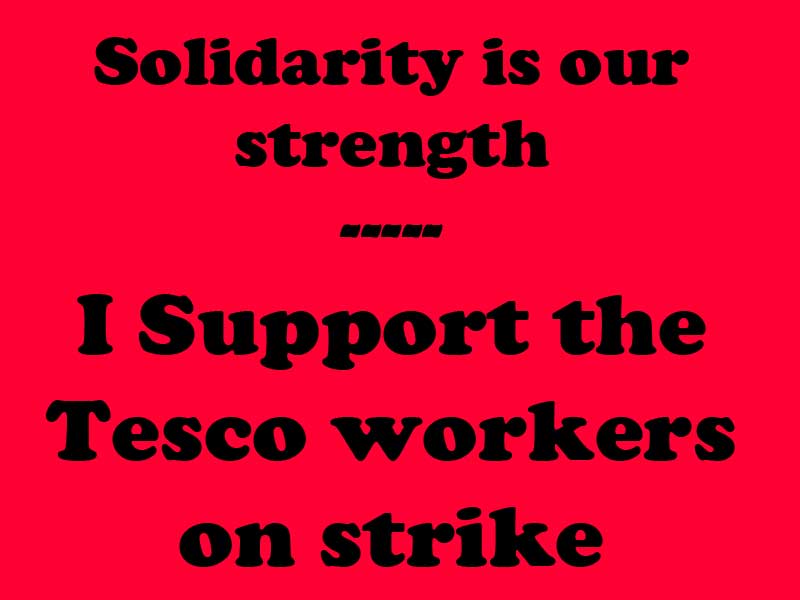 Tesco stores across Ireland will strike from today against 'race to the bottom' wage and conditions changes the company is trying to impose on long term workers.
Tesco stores across Ireland will strike from today against 'race to the bottom' wage and conditions changes the company is trying to impose on long term workers.
The Tesco’s scheme would impose up to a 20% pay cut on long-term staff. These workers, who have worked for the company for 20 years or more, are currently paid 14 euro an hour, and Tesco want to slash that. That this wage is seen as too high, in particular after 20 years' service, shows why it's important for all of us that the Tesco workers win their strike.

